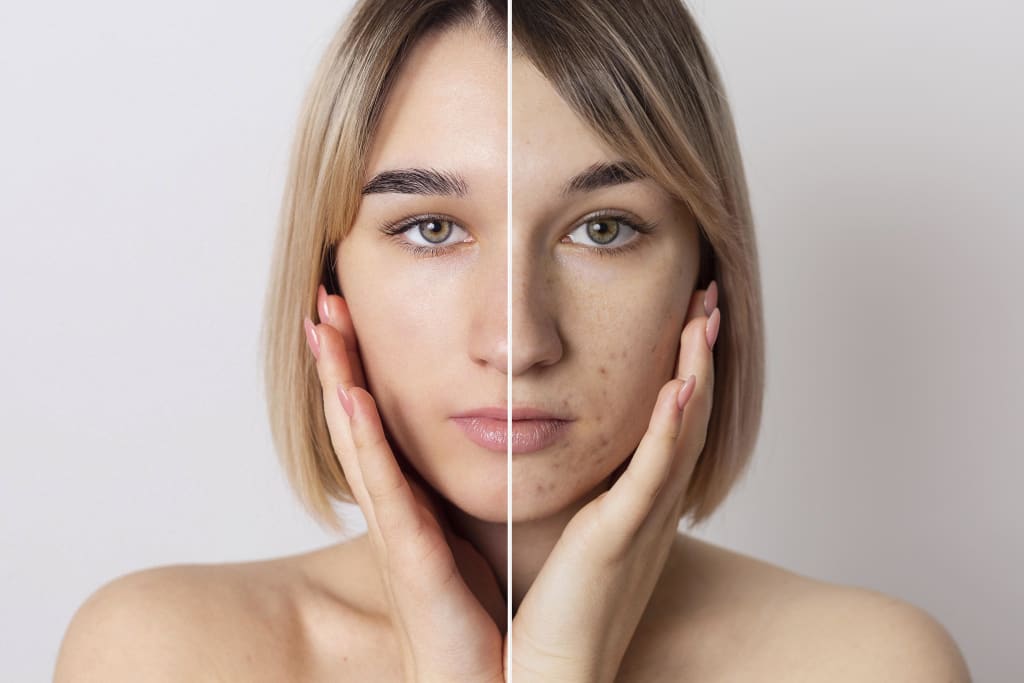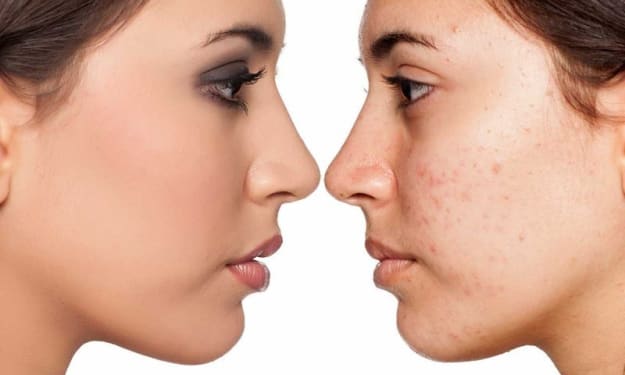All You Need To Know About Acne-Prone Skin - Types, Causes And Treatments
Acne Treatment

Most of us have experimented with every purported anti-acne field, from the greatest acne treatments with unquestionable web evaluations to hunting out top DIY remedies for acne. We have prayed for clear skin, cut back on our sugar intake, and used every spot treatment known to man, yet that awful pimple is still there.
All skincare experts have been searching for that one anti-acne solution that can control oil production, stop breakouts, and clear the skin for a very long time. But because every skin type is different and has certain characteristics, there is never a universal treatment for acne. Continue reading as we dive into the causes of acne-prone skin and effective treatments for it.
Why Is Skin Prone to Acne?
We refer to this condition as "acne" when the skin's pores become blocked and produce bumps or occasionally cysts on the surface.
Sebaceous Glands, which are tinier glands that can be located beneath the skin's surface, are where the pores are connected. These are designed to produce an oily material called sebum to lubricate the skin and hair to stop it from drying out. Skin that is prone to acne is caused by the sebaceous glands not functioning properly, which leads to an imbalance in the production of sebum. In the follicle, the extra sebum combines with dirt or dead skin cells to produce a clog that eventually inflames to form the unsightly pimple.
There are many things that might cause or aggravate acne-prone skin, from dietary imbalances to—even now—the masks we wear all day.
Hormonal changes : Androgens are hormones that rise during puberty, causing the sebaceous glands to grow and the production of sebum to increase. Breakouts are frequently caused by hormonal changes throughout midlife, pregnancy, or even during the menstrual cycle.
Medications : Acne can also be brought on by some medications that contain corticosteroids, testosterone, or lithium. This brings us full round to the subject of hormonal imbalance; medications like testosterone affect the body's normal hormone levels, causing acne and outbreaks.
Diet: Yes, dear reader, even something as simple as eating may cause heartbreak (outbreaks) and frequently can serve as the best acne therapy. According to studies, some components may contribute to acne-prone skin. Acne can be aggravated by processed diets, an increase in carbohydrates, fat and hydrogenated oils, spicy, pungent foods, meats, alcohol, and even coffee. Yes, they are the greatest parts of your typical diet, but in difficult times, drastic measures are called for!
How Do I Get Rid Of Acne-Prone Skin Permanently?
Everyone who has ever had acne will concur that treating the condition's symptoms or consequences is the immediate drive for treatment. Google searches typically go something like "how to get rid of a pimple overnight?" rather than "what is causing acne on my skin?" According to studies, treating the root of the problem is the first step in effectively treating acne-prone skin. The best place to start when trying to permanently get rid of acne is by first understanding the type of acne you have, how it forms, and what is causing it, and then eradicating those causes.
Most of us have experimented with every purported anti-acne field, from the greatest acne treatments with unquestionable web evaluations to hunting out top DIY remedies for acne. We have prayed for clear skin, cut back on our sugar intake, and used every spot treatment known to man, yet that awful pimple is still there.
All skincare experts have been searching for that one anti-acne solution that can control oil production, stop breakouts, and clear the skin for a very long time. But because every skin type is different and has certain characteristics, there is never a universal treatment for acne. Continue reading as we dive into the causes of acne-prone skin and effective treatments for it.
Why Is Skin Prone to Acne?
We refer to this condition as "acne" when the skin's pores become blocked and produce bumps or occasionally cysts on the surface.
Sebaceous Glands, which are tinier glands that can be located beneath the skin's surface, are where the pores are connected. These are designed to produce an oily material called sebum to lubricate the skin and hair to stop it from drying out. Skin that is prone to acne is caused by the sebaceous glands not functioning properly, which leads to an imbalance in the production of sebum. In the follicle, the extra sebum combines with dirt or dead skin cells to produce a clog that eventually inflames to form the unsightly pimple.
There are many things that might cause or aggravate acne-prone skin, from dietary imbalances to—even now—the masks we wear all day.
Hormonal changes : Androgens are hormones that rise during puberty, causing the sebaceous glands to grow and the production of sebum to increase. Breakouts are frequently caused by hormonal changes throughout midlife, pregnancy, or even during the menstrual cycle.
Medications : Acne can also be brought on by some medications that contain corticosteroids, testosterone, or lithium. This brings us full round to the subject of hormonal imbalance; medications like testosterone affect the body's normal hormone levels, causing acne and outbreaks.
Diet: Yes, dear reader, even something as simple as eating may cause heartbreak (outbreaks) and frequently can serve as the best acne therapy. According to studies, some components may contribute to acne-prone skin. Acne can be aggravated by processed diets, an increase in carbohydrates, fat and hydrogenated oils, spicy, pungent foods, meats, alcohol, and even coffee. Yes, they are the greatest parts of your typical diet, but in difficult times, drastic measures are called for!
How Do I Get Rid Of Acne-Prone Skin Permanently?
Everyone who has ever had acne will concur that treating the condition's symptoms or consequences is the immediate drive for treatment. Google searches typically go something like "how to get rid of a pimple overnight?" rather than "what is causing acne on my skin?" According to studies, treating the root of the problem is the first step in effectively treating acne-prone skin. The best place to start when trying to permanently get rid of acne is by first understanding the type of acne you have, how it forms, and what is causing it, and then eradicating those causes.





Comments
There are no comments for this story
Be the first to respond and start the conversation.